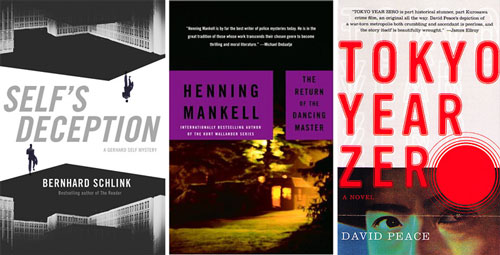
Over the Christmas holidays, I read three Black Lizard mysteries from Vintage books, all by different authors. Each book related in some way to World War 2. One is set in Germany, one in Sweden, and one in post-war Japan. One is outstanding, the others not so much.
“Self’s Deception,” by Bernhard Schlink. Schlink wrote a series of mysteries around Gerhard Self, a private detective in Germany. He’s 69 years old, and had fought in the German army, and there are references to skeletons. The plot involves searching for a young woman who has gone missing. Self finds her fairly quickly, but things get complicated fast. We end up amidst a terrorist attack on an American installation where poison gas from the war is kept.
I didn’t care for this book. I never got a good sense of Gerhard Self, never found a reason to find him the least bit interesting. The book had little action (read: violence), and the plot, though suitably intricate, never engaged me. I forced myself through the final pages, not caring how it turned out. Very disappointing for a Black Lizard book.
Philip Kerr’s “Berlin Noir” books about PI Bernie Gunther are far more interesting, with a fully developed, fascinating protagonist. But Kerr is Scottish, not German, and he shapes Gunther more like an American rule-breaking investigator. It’s always interesting to see how writers in other cultures build a mystery hero…except that Self is a boring character.
“The Return of the Dancing Master,” by Henning Mankell. This is an amazing, engrossing book. Mankell departs from the Kurt Wallander saga to introduce us to Stefan Lindman, a policeman on medical leave (he has cancer) who gets involved in the case of a former colleague who was brutally murdered. The motive for the murder, revenge, traces back 50 years to the latter days of World War 2.
I don’t know where to begin. Suffice it to say, this is Henning Mankell at his best (or second-best, after “The White Lioness”). Lots of detail, a true police procedural of following leads this way and that way, sometimes down dead-ends. Personal dramas are woven seamlessly into the narrative.
I read 200 pages on Christmas Eve, and the other 200 pages on Christmas Day. Mankell writes with the magnetic attraction that irresistibly pulls you along, chapter by chapter. My guesses about how it would end proved wrong, though I did have valid suspicions. At any rate–if you like mysteries, read this book.
“Tokyo Year Zero,” by David Peace. This book begins the day Japan surrenders, but mostly occurs a year later with the US occupation in full swing. A Japanese policeman is investigating the murders of a number of young women, amid the backdrop of a ravaged city and a populace seeking order and food.
I like plots that occur within a larger context. Philip Kerr’s “Berlin Noir” books do that, a mystery unfolding as the Nazis rise to power or during the Allied occupation; Dan Fesperman’s mysteries occur within the context of the Bosnian war. But in “Tokyo Year Zero,” the occupation was far in the background. I wanted much more.
“Tokyo Year Zero” could have been fascinating in that regard. But Peace takes a very artsy-fartsy, psychological approach, and I just didn’t care enough to figure out what he was doing. I just wanted an interesting ride, so I guess I was the wrong reader in the wrong mood. I found the book difficult to read, even as others heap acclaim on it. I finished it, but I’m not sure what exactly happened. Yet I did gain some insights into the post-war occupation, and am interested enough to perhaps read some nonfiction about it.






